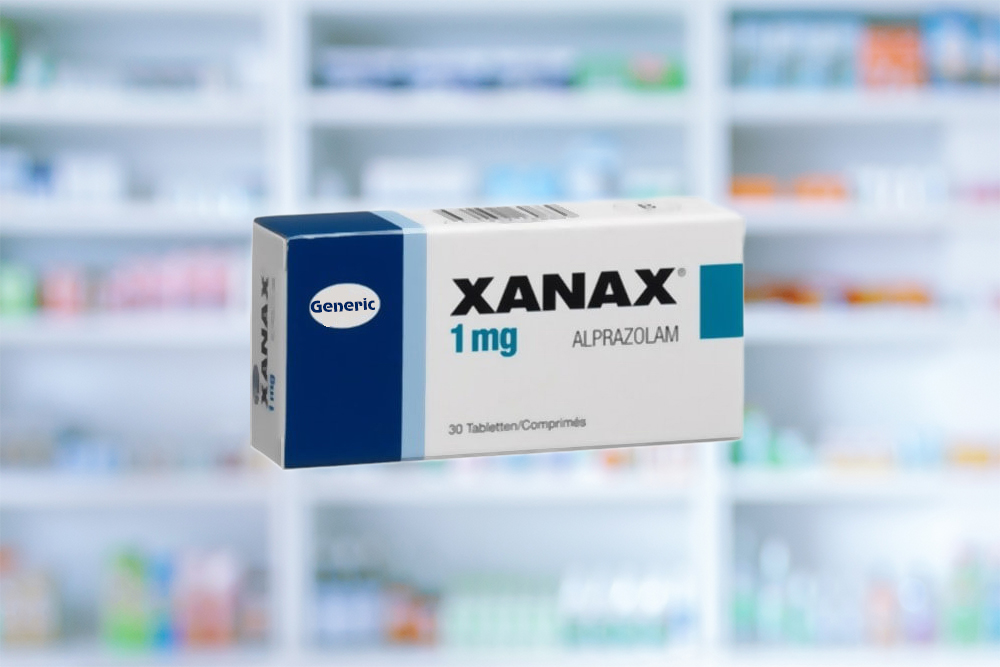Xanax, known for its active ingredient Alprazolam, is a medication from the group of benzodiazepines. This medication is widely used in medical practice to treat conditions associated with anxiety and panic attacks.
Uses and Efficacy:
- Primary Use: Treatment of anxiety disorders and panic attacks.
- Additional Uses: May be used to treat certain types of depression where anxiety is a primary symptom, and in cases of insomnia caused by stress and anxiety.
Buy Xanax (Alprazolam) Without Prescription
- Drug Name:
- Xanax (Alprazolam)
- Tablet Strength:
- 1 mg
- How to Start Order:
- Get Started
Xanax (Alprazolam) can be useful in treating certain mental disorders, but its abuse can lead to serious health problems and severe addiction. Patients who abuse Xanax should get help from substance abuse and mental health professionals.
If you or someone you know is suffering from Xanax addiction, it is essential to seek help from a qualified doctor. Specialists can offer a variety of treatments, including therapy and medication management, to help the patient overcome the addiction and regain their health. In addition to medication treatment, patients addicted to Xanax may require psychotherapy, rehabilitation programs, and other types of support.
How Xanax Works
The drug has broad pharmacological capabilities in the treatment of anxiety disorders. Taking the tablets has a complex calming effect on the body. The mechanism of action is to activate the inhibitory effect of endogenous GABA, in the central nervous system - there is a rapid increase in the sensitivity of GABA receptors, and the excitability of subcortical brain structures is also reduced.
The second important aspect of Xanax (Alprazolam) is its moderate hypnotic effect, which allows a person to reduce anxiety, relax, and fall asleep. If the recommended dose is exceeded, the drug has the opposite effect: a person feels euphoric, carefree, significantly improves mood, and forgets about depression or other problems. With prolonged uncontrolled use, drug dependence develops, mental disorders appear, and the person's overall mental health is also impaired.
Indications for Use
The main indications for the use of Xanax also include sociophobia, panic attacks. The drug helps to quickly eliminate nausea and anxiety in cancer patients undergoing chemotherapy. To prevent adverse effects, the drug should be taken only as prescribed by the attending physician, without exceeding the recommended doses. Despite the fact that Xanax does not belong to narcotic drugs, it is addictive and provokes the development of pathological drug dependence.
Since Xanax (Alprazolam) is a fairly strong psychoactive agent, it has a pronounced narcotic effect if the dosage is exceeded. Overdose is fraught with a number of extremely unfavorable consequences, up to the death of the patient.
Signs of Xanax Use
Signs of Xanax use are pronounced, especially in people suffering from problems associated with a disorder of the nervous system. People become calm and peaceful.
However, with systematic use and abuse (exceeding the recommended doses), the following signs of Xanax use are manifested:
- Severe headaches
- Rapid fatigue even without significant physical activity
- Disturbances in sleep and wakefulness
- Irrational thinking, confused thoughts, speech disorders
- Vomiting and vomiting
- Limb tremors, muscle spasms in various parts of the body
- High sweating, even at normal ambient temperature
Doctors in the United States note that after taking the drug, changes in appearance may be observed, the person's face swells quickly, the throat, tongue, and other parts of the body (especially the limbs) may swell.
Side Effects of Xanax
Despite the high efficacy of Xanax as a sedative, its use can cause a number of side effects that should be taken into account by the doctor when prescribing it, as well as by the patient when using it.
The main side effects of Xanax are:
- Central nervous system - dizziness, headache, impaired concentration, hallucinations, impaired coordination, etc.
- Digestive system - diarrhea, constipation, dry mouth, liver dysfunction.
- Cardiovascular system - lowered blood pressure, tachycardia, leukopenia, anemia.
Some disorders of the hematopoietic, genitourinary and endocrine systems are possible. The type and nature of side effects directly depends on the individual characteristics of the patient's body. But the main side effect is the gradual formation of dependence.
Conclusion
Xanax (Alprazolam) is a highly effective medication for the management of anxiety disorders and panic attacks, but its use must be accompanied by strict medical supervision due to the risk of addiction and the presence of side effects. It is important to weigh the risks and benefits of treatment with this medication by discussing them with a qualified medical professional.








